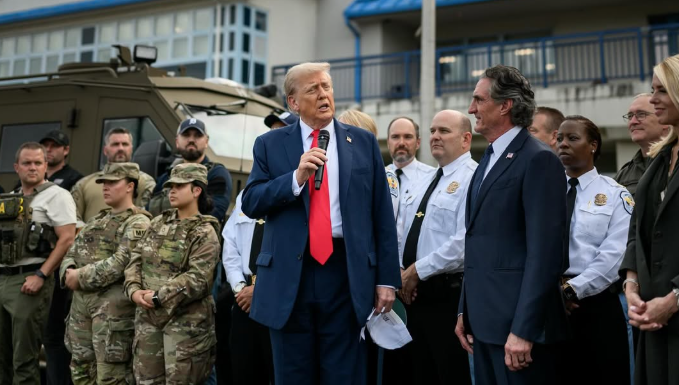Trump: “Lawless cities with inept mayors,” hints at deploying National Guard to Chicago
Input
Modified
Chicago targeted next for immigration enforcement 2,000 troops already deployed in Washington Expansion to 19 states expected within weeks

President Donald Trump has signaled that, following the capital Washington, D.C., he will deploy National Guard units to other cities such as Chicago and New York to restore law and order. The move, intended to reinforce public security through military deployment, has triggered fierce backlash from Democrats, who argue it usurps the prerogatives of state governors.
Trump singles out Chicago after Washington, D.C. and Los Angeles: “Will step in to restore order”
According to Reuters on the 24th (local time), Trump stated on the 22nd that the ongoing law-and-order operation in Washington, D.C., had been successful and that he intends to expand it to other cities. “Chicago is a mess. It has a very incompetent mayor,” he said, adding, “That may well be next.” He further asserted, “Chicago residents, especially beautiful African-American women, are pleading, ‘Please come.’”
The president declared a “war on crime” on the 11th targeting Washington, D.C., deploying some 2,000 National Guard troops. Earlier in June, citing disorder stemming from protests against immigration crackdowns, he had already deployed National Guard units to Los Angeles and Washington, D.C. The units primarily support Immigration and Customs Enforcement (ICE) through data collection, fingerprinting and DNA sampling, photographing detainees, and other law enforcement assistance. Recently, Defense Secretary Pete Hegseth authorized them to carry weapons.
Debate over legality of federal deployment without governors’ consent
Trump’s singling out of Chicago as the next target prompted immediate backlash from Mayor Brandon Johnson and Illinois Governor J.B. Pritzker, who denounced the plan as an “illegal abuse of power.” Johnson remarked, “There is much the federal government can do to help reduce violence in Chicago, but sending in the military is not one of them.” Governor Pritzker echoed on social media, calling it a “dictatorial power grab over major cities,” adding that Trump is “fostering fear in communities and destabilizing existing public safety efforts.”
The crux of the controversy lies in whether the president has the legal authority to deploy the National Guard without the consent of state governors. Legal experts contend that the president cannot unilaterally dispatch National Guard units. While Washington, D.C., as a federal district, falls under direct presidential authority, in states such as Illinois the governor is commander-in-chief of the Guard. Governor Pritzker emphasized, “You do not have the authority to seize control of Chicago,” underscoring the lack of presidential power in this matter.
Democrats also refuted Trump’s justification of “violent crime” as the rationale for his extraordinary measures. They noted that violent crime in Washington, D.C. and other targeted cities is in fact on a downward trajectory. According to statistics from the D.C. Metropolitan Police Department, cited by the New York Times, violent crime has declined steadily in recent years. While incidents spiked briefly in 2023, they fell by 35% the following year and have continued to trend downward into August 10 this year. Even the 2023 surge remained below levels recorded between 2010 and 2016, and this year’s figures are at their lowest since 2010.
Nonetheless, counterarguments persist, highlighting that the absolute threat of violent crime remains intolerable. Law-and-order advocates insist that “even a 30% annual decline does not justify tolerating any violent crime whatsoever,” contending that reliance on statistical decreases for political self-justification does not equate to genuine safety guarantees.

Deployment across 19 states to aid immigration enforcement; creation of protest-response units under review
Separately from the Washington operation, the Trump administration is preparing to mobilize National Guard units in 19 states to assist with immigration enforcement. According to Fox News, up to 1,700 Guard members from states including Alabama, Florida, and Texas will be deployed to support ICE under the Department of Homeland Security. Their tasks will be limited to administrative support, such as collecting biometric data, fingerprinting, and processing documents, rather than frontline law enforcement.
In addition, the administration is considering establishing new Guard units dedicated to protest response. The Washington Post reported that the Pentagon plans to organize 600 Guard troops into two battalions of 300 each, stationed at bases in Alabama and Arizona. The units will be tasked with covering the eastern and western United States respectively, poised to mobilize within an hour in the event of large-scale unrest. Armed and equipped with riot-control gear, they may be deployed in detachments of 100, but under heightened alert all 300 could be dispatched immediately.
Although Guard units already maintain rapid-response teams for local emergencies, the administration’s plan would allow their deployment across state lines. The president is authorized under Titles 10 and 32 of the United States Code to call up Guard forces for public security missions. According to the Post, the administration intends to rely on Title 32, which permits broader law-enforcement functions, as the legal basis for forming protest-response units, rather than Title 10, which imposes greater restrictions on arrests and investigations.
However, such deployments would still require governors’ consent, raising the potential for political confrontation between state and federal authorities. During his first term, Trump had already designated 600 Guard troops in Arizona and Alabama as rapid-response units ahead of the 2020 election, in response to nationwide protests over the police killing of George Floyd. At that time, he even considered deploying active-duty combat troops, but the plan was shelved due to opposition from Pentagon leadership concerned about the politicization of the military.





















